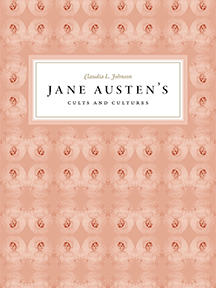By Carol A. Leibiger
Claudia Johnson’s work is a study of “Jane Austen,” the paragon constructed by “Janeist” fandom, whose intense worship has become institutionalized around her image, living spaces, possessions, and works. The author, Murray Professor of English Literature at Princeton University, provides a fascinating examination of Janeism, demonstrating how “Jane Austen” has been (re)invented to meet the needs of successive generations of her faithful since her death.
Individual chapters treat varying cultural understandings of “Jane Austen.” The first and final chapters examine material culture, engaging conceptions of Austen’s body, her dwellings, and her possessions. Johnson traces the “desubstantiation” of Austen’s body that began after her death and subsequent attempts to resolve this absence via the creation and institutionalization of competing images, all of which have been controversial. (Interestingly, a recent effort to create a British banknote in Austen’s honor has run afoul of uncertainty as to her actual appearance.) The final chapter contrasts the memorialization of Austen in the Jane Austen Museum and other Austen habitations with the absence of both her and her possessions from these places, denying us intimacy with her. Johnson argues convincingly that Austen’s absent body, disappearing spaces, and missing possessions have focused fandom on her writings, neatly linking this book’s framing discussions of material culture with interior chapters on Austen’s popular reception.
Johnson’s three middle chapters engage the popular reception of Austen’s works during the Victorian and First- and Second-World-War periods, demonstrating how her writings have bolstered prevalent notions of, and reactions to, disillusionment with modern times. Whereas the Victorians “invest[ed] Austen’s very mundaneness with magical quaintness…as a reaction to [their] own disenchantment with modernity,” twentieth-century fandom has found in Austen’s writings “soothing propriety, elegance, and grace in the menacing, semibarbarous wilderness in which it finds itself and the cultural trends at home that similarly threaten the refinements it values.” This “elegiac ethos…that contrasts Georgian loveliness with modern hideousness” has been challenged since the 1940s by academics, resulting in two camps, one seeing itself as knowing, sophisticated, and professional, the other characterized as ignorant, naïve, and amateur. The ensuing conflicts over Austen have reflected the modern culture wars, especially as academics have examined her writings using critical approaches that apply political, socioeconomic, and (especially) sex/gender-based lenses to her works.
That Austen’s works continue to speak to audiences across contexts is, of course, an indication of the universal applicability that allows great literature to endure beyond its own time. Johnson’s contribution is to demonstrate not so much Austen’s greatness within highbrow culture, but to indicate the reasons for her continuing popularity in “small-c” culture, where “Austen can never be out of date, because she…is coextensive with human nature.”
This book has, justifiably, received Phi Beta Kappa’s Christian Gauss Award for excellence in the field of literary scholarship or criticism, although it examines “Jane Austen” rather than her literature per se. The book occasionally suffers from poor editing (e.g., critic Caroline Spurgeon’s name is repeatedly rendered as Sturgeon), and its appeal to general readers might be limited by a tendency to indulge in “lit-crit” jargon like “the protodeconstructive potential of formal parody.” However, Johnson provides an intriguing look at the cultural construct “Jane Austen” that focuses both on her physical absence and the Janeites’ discovery of Austen in her texts. The book’s conclusion raises provocative questions about the future of Janeism in a world in which celebrity is mediated by visual culture, a “game-chang[e]” whereby Austen’s elusiveness is no longer solely accessible in her novels, and the pleasures of reading Austen are potentially lost to readers.
Carol A. Leibiger (ΦΒΚ, University of Connecticut, 1977) is Associate Professor in the University Libraries at the University of South Dakota and a resident member of the Alpha of South Dakota Chapter of Phi Beta Kappa.




